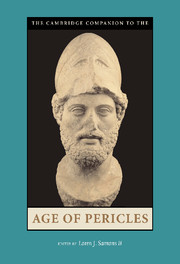Book contents
- Frontmatter
- Introduction: Athenian History and Society in the Age of Pericles
- 1 Democracy and Empire
- 2 Athenian Religion in the Age of Pericles
- 3 The Athenian Economy
- 4 Warfare in Athenian Society
- 5 Art and Architecture
- 6 Other Sorts: Slaves, Foreigners, and Women in Periclean Athens
- 7 Drama and Democracy
- 8 The Bureaucracy of Democracy and Empire
- 9 Plato’s Sophists, Intellectual History after 450, and Sokrates
- 10 Democratic Theory and Practice
- 11 Athens and Sparta and the Coming of the Peloponnesian War
- Conclusion: Pericles and Athens
- Bibliography
- Index
10 - Democratic Theory and Practice
Published online by Cambridge University Press: 28 March 2009
- Frontmatter
- Introduction: Athenian History and Society in the Age of Pericles
- 1 Democracy and Empire
- 2 Athenian Religion in the Age of Pericles
- 3 The Athenian Economy
- 4 Warfare in Athenian Society
- 5 Art and Architecture
- 6 Other Sorts: Slaves, Foreigners, and Women in Periclean Athens
- 7 Drama and Democracy
- 8 The Bureaucracy of Democracy and Empire
- 9 Plato’s Sophists, Intellectual History after 450, and Sokrates
- 10 Democratic Theory and Practice
- 11 Athens and Sparta and the Coming of the Peloponnesian War
- Conclusion: Pericles and Athens
- Bibliography
- Index
Summary
The basic institutions of the Athenian republic, including the assembly, the council, election and sortition, and the courts, had been fashioned before Xerxes invaded Greece in 480. But the word demokratia, first attested in the work of Herodotos, was coined later, about the middle of the fifth century, and it soon came to be applied to Athens. Thereafter it figured prominently in discussions of political theory. Yet the average Athenian, admittedly an elusive person, did not concern himself much with theoretical discussion, if one may judge from the plays of Aristophanes, who offers the modern reader a closer approach to everyday life than any other writer of the fifth century. So it is advisable first to study the institutions of the Athenians in their historical development and then to ask what principles they imply. That is, one should proceed from practice to theory.
The Emergence of the Polis
Modern understanding of the way society developed in Greece early in the historical period has changed radically in the last two decades. Previously it was believed that, after the collapse of the civilization of the Bronze Age (ca. 1200), migrating bands of people wandered until they found land to settle. Supposedly, when they did so, in the typical community hereditary kingship arose from the former leader of the migratory host, commanders of groups within the host became a council advising the king, and from the parade of all the warriors there arose an assembly of adult male citizens to decide issues by vote. On this view the political history of the emergent cities was to be reconstructed as a series of struggles between monarchy, aristocracy, and democracy.
- Type
- Chapter
- Information
- The Cambridge Companion to the Age of Pericles , pp. 238 - 257Publisher: Cambridge University PressPrint publication year: 2007
- 1
- Cited by



